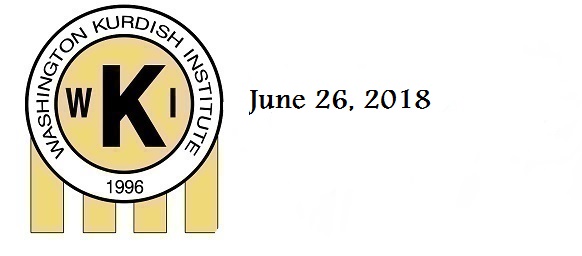964
Iran
- Crackdowns on Kurdish border workers(Kolbars) continue by the Iranian regime. Last week the Iranian regime border guards ambushed a group of Kurdish Kolbars which resulted in the severe injury of one and confiscation of their goods near Sardasht city. Meanwhile, another Kolbar from Mahabad lost his life due to a heart attack while carrying a load of goods also near Sardasht. On several occasions, Iranian politicians pledged to issue permits to Kurdish border workers, but no actions have been taken by the regime so far.
- The Democratic Party of Iranian Kurdistan (KDP-I) announced the death of one senior Peshmerga commander (Saman Hassanpour) after the Islamic Revolutionary Guard Corps (IRGC) clashed with KDP-I Peshmerga fighters on June 23. In a statement, the KDP-I announced that the clashes took place “in the mountains of Ziwa and Kona Lajan in Piranshar which resulted in “a number of casualties” among the IRGC. On Sunday the Iranian regime confirmed the deaths of Second Lieutenant Seyyed Mohammad Hashemi and another soldier. On March 2016, the KDP-I announced the return to armed struggle against the Iranian regime.
Iraq
- The recount for last month’s elections began on Saturday for the Kurdistan Region, according to Mazen Abdelkader, head of the electoral commission in the Kurdish Regional Government. Following suspicions of fraud and vote rigging of the May 12 elections, Iraq’s parliament amended Iraqi election laws to allow a manual recount. Monday was the deadline for Kurdish political parties who complained of vote rigging to form coalitions, but the deadline was extended for a second time to June 27.
- The Kurdistan Islamic Union (KIU) and Kurdistan Islamic Movement (KIM) will form a coalition called “Toward Reform” for the September 30 Kurdish elections. Gorran (Change Movement) and the Communist Party of Kurdistan (both secular parties) KIU and Komal (both Islamic parties), and the Coalition for Democracy and Justice (CDJ) all rejected the results of Iraq’s May 12 elections. It is not known yet whether Gorran will join the “Toward Reform” coalition.
- US Central Command (CENTCOM) commander Joseph Votel and Consul General to Erbil Ken Gross headed a US delegation that met with KRG Prime Minister Nechirvan Barzani in Erbil Sunday that “stressed the importance of military coordination among coalition, Iraqi and Peshmerga forces, especially in hunting remnants of ISIS and eliminating their recent movements in the region,” according to a KRG statement. The KRG hopes US funding will continue next year.
Syria
- The Syrian Democratic Forces’ (SDF) units taking part in the ongoing Operation Al-Jazeera Storm have claimed to have pushed the Islamic State out of Al-Hasaka Governorate, after successfully liberating dozens of villages as well as the stronghold of Ad-Dashisha. This marks major progress in the allied offensive to clear the Islamic State out of Eastern Syria. SDF soldiers will most likely look southward to push ISIS from the Deir Ez-Zour Governorate next, where some of the last bastions of the extremist group’s power remain. The town of Hajin, on the eastern bank of the Euphrates purportedly holds 65 1st rank commanders of the Islamic State, and the enclave around it contains the bulk of the organization’s remaining fighters. It is seen as the next major target of the US-led coalition offensive, and one of the final objectives of both local and international anti-extremist groups. Units remaining in Hasaka will engage in counter-insurgency tactics against underground Jihadi cells, while rebuilding destroyed infrastructure and clearing ISIS mines and traps left throughout the region.
Turkey
- Turkish citizens at home and abroad went to the polls on June 24th to elect a president and parliament, with the result being a major victory for President Recep Erdogan and his Islamist party of Justice and Development (AKP). Success in this election has given Erdogan sweeping new powers, which have been added to the presidential position. Erdogan won the popular vote with 53% of ballots cast, with The AKP taking 43% of the parliamentary vote. In coalition with the far-right MH party, which took 11% of the vote, Erdogan’s government will have a functioning majority in Turkey’s unicameral Grand National Assembly. Fears of the legitimacy of the election have been on the rise as videos emerge of ballot stuffing with reports of intimidation of voters were widespread before the election.
- Despite facing severe abuse and repression at the hands of police and right-wing thugs during the campaign season, the pro-Kurdish HDP won approximately 12% of the parliamentary vote, coming first in 11 provinces. This victory allows the progressive party to enter the parliament, having passed the 10% threshold of participation. Imprisoned HDP presidential candidate Selahattin Demirtas released a statement from his cell in Edirne congratulating the HDP on entering the parliament, and voters and supporters for persisting in an election which was “without justice or equality”. Demirtas’ imprisonment during the election was a major obstacle to the success of the HDP, which the leader himself called, “the greatest injustice of the elections”.
- The Organization for Security and Cooperation in Europe (OSCE) deployed advisors and observers to monitor the elections and their fairness. These observers were often harassed or denied entry into Turkish government and electoral facilities, several even being detained by security forces. The observer mission concluded that while voter turnout was healthy, opposition groups such as the HDP and CHP faced unfair and unequal conditions in both the electoral process itself, and the run-up to it. This included ubiquitous tampering with ballots and voting locations, intimidation and even outright assault of election and opposition party officials at the polls by both police and civilians, as well as a host of other irregularities reported across almost every province.

